Orwin and Cleon Hinds, Kevin October and Roy Jacobs were yesterday each sentenced to 81 years in jail for the murder of 72-year-old Clementine Fiedtkou-Parris, who was gunned down at her Robb Street, Georgetown home just over four years ago.
The men, who continued to maintain their innocence in the crime, were sentenced by Justice Navindra Singh after a jury returned unanimous guilty verdicts at the conclusion of their trial at the High Court, in Georgetown.
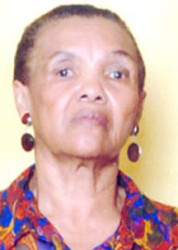
The charge against them stated that on June 30th, 2011, they murdered the elderly woman, pursuant to an arrangement whereby money was intended to pass from one person to another. Orwin Hinds and October repeatedly shook their heads in disbelief after learning their fate. They muttered to themselves as they sat in the prisoner’s dock, gazing at the roof in apparent shock.
When given a chance to speak before being sentenced, the convicts all fumed about being convicted for an offence they knew nothing about, while maintaining their innocence.
Orwin Hinds, who celebrated his birthday yesterday, angrily argued that apart from him saying that he was innocent of the charge, his ex-girlfriend had also testified that he was at home with her at the time of the murder.
In mitigation, his attorney George Thomas said that Hinds had no previous antecedents. He begged the court for a minimum sentence and informed that his client was celebrating his birthday.
Hinds’ ex-girlfriend, Adel Campbell, had testified that on the night of the murder, he was at home with her after they both attended a birthday lime. According to her, he was in her company all night.
October, meanwhile, questioned the possibility of him being able to commit the crime. His alibi was that he was in police custody when the crime was committed. He argued that the prosecution failed to disprove his claim that he was in custody at that time.
Referring to one of the police witnesses called by the state, October said that the witness testified that he was indeed in custody on the morning of June 30th, 2011.
“A check of the records would have shown that,” October argued.
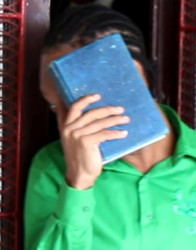
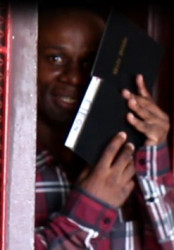
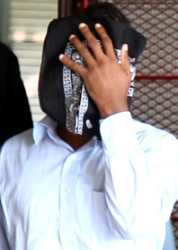
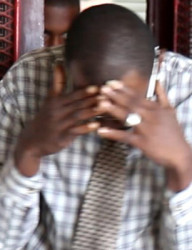
His foster sister, Susan Weeks, had testified on his behalf that she had taken meals for him that morning at the lock-ups and that he was in police custody that entire day.
October’s lawyer, Moti Singh, also begged the court for a minimum sentence for his client.
However, rebutting October’s alibi, prosecutor Teshanna James-Lake had argued during the trial that while he was in custody in the morning, “he was on the road by the night of June 30th, 2011 to do his crime.”
The elderly woman was gunned down on that night at her Lot 42 Robb Street, Georgetown home.
For his part, Cleon Hinds, 38, said that he was just picked-up by the police and slapped with the charge although he knew nothing about it. His attorney, Raymon Ali, asked for a minimum sentence as well.
Jacobs too said that he knew nothing about the charge. His attorney, Maxwell McKay, was absent when the verdicts were returned. Thomas, however, begged for the minimum sentence for Jacobs also.
When asked whether the state had anything to say before the sentencing, Lake noted that, “the jury has spoken and the state would be guided by whatever sentence the court imposes.”
In handing down sentence, Justice Singh explained that irrespective of the roles each person would have played in the commission of the crime, they would each be sentenced to same amount of years behind bars. This, he said, is because the law views them as being equally liable, since they operated as parties of one common joint-enterprise plan.
Justice Singh commenced the sentence at a base of 60 years. He then added 10 years each for premeditation and the fact that the murder was executed for payment. One additional year was added because a firearm was used in the commission of the offence.
Justice Singh noted the prevalence with which offences are being committed involving the use of guns.
The judge said that the convicts will become eligible for parole only after they would have spent 45 years behind bars.
Visibly overcome with emotion, relatives of the four men who could not contain themselves, had to leave the courtroom as their cries grew louder and louder. One woman who wailed loudly after hearing that the men had been convicted, left even before the sentences were passed.
As they made their way out of the courtroom, the disappointed convicts murmured among themselves. A visibly angry Orwin Hinds appeared quite agitated as a relative admonished him to “be strong.”
Before exiting the courtroom, Jacobs, in a barely audible tone, ranted towards Justice Singh that it was unfair that he had been convicted, and that God was his judge. “God is in charge though, and he’s me judge,” Jacobs declared.
Chaos broke out among relatives of the convicts on the corridors outside as they were being escorted from the courtroom under heavy police guard.
Attorneys Thomas and Singh signaled their intention to appeal.
According to Lake, police investigations had led to Orwin, October, Cleon and Jacobs being arrested and charged.
The state in its closing addresses to the jury on Monday morning argued that the men were each responsible for the woman’s death. The prosecutor had argued further that the caution statements, which the accused gave, were freely and voluntarily provided by them.
The Hinds brothers and Jacobs had testified in their defence that they were badly beaten to sign statements prepared by the police. They claimed that they were in pain and afraid and, as a result, signed the documents.
Lake said that during police investigations, the men “sang like canaries. They talked themselves into jail.”
The prosecutor also said that as they spoke to investigators, what the men did not know, was that it was immaterial whether each would have actually been the “triggerman or not.”
“They clearly did not know how the law operates,” Lake declared, while explaining to the jury that they each would be regarded as operating as part of a “joint enterprise,” irrespective of who actually did the shooting.
The evidence led at the trial included a statement from the dead woman’s brother, Fitzroy Fiedtkou, (who is also now deceased), who had identified Jacobs as the shooter.
Lake had argued during the trial that the evidence in the state’s case against the men was “overwhelming, cogent and compelling,” while adding that the state had proven its case beyond reasonable doubt.
The trial commenced on November 2nd and saw 28 state witnesses taking the stand.




